A Critical Analysis: Should We Blame Patient Zero for Disease?
VerifiedAdded on 2023/06/11
|10
|2735
|296
Essay
AI Summary
This essay critically analyzes the ethical question of whether 'patient zero' should be blamed for the spread of infectious diseases, examining the issue through five major ethical perspectives: Utilitarianism, Kant’s Categorical Imperative, Rawls’s Justice as Fairness, Communitarianism, and Altruism. The essay discusses how each perspective views the responsibility and potential blame of the index case in spreading a disease, referencing relevant literature to support its arguments. It delves into the principles of each ethical framework, such as maximizing good for the greatest number (Utilitarianism), adhering to universal moral duties (Kantian ethics), balancing equality and freedom (Rawls), promoting shared moral values (Communitarianism), and prioritizing the well-being of others (Altruism). The analysis concludes by assessing the extent to which 'patient zero' can be held accountable under each ethical lens, considering factors like individual rights, societal well-being, and the moral obligations of individuals within a community. Desklib provides a platform for students to access this essay and other solved assignments.
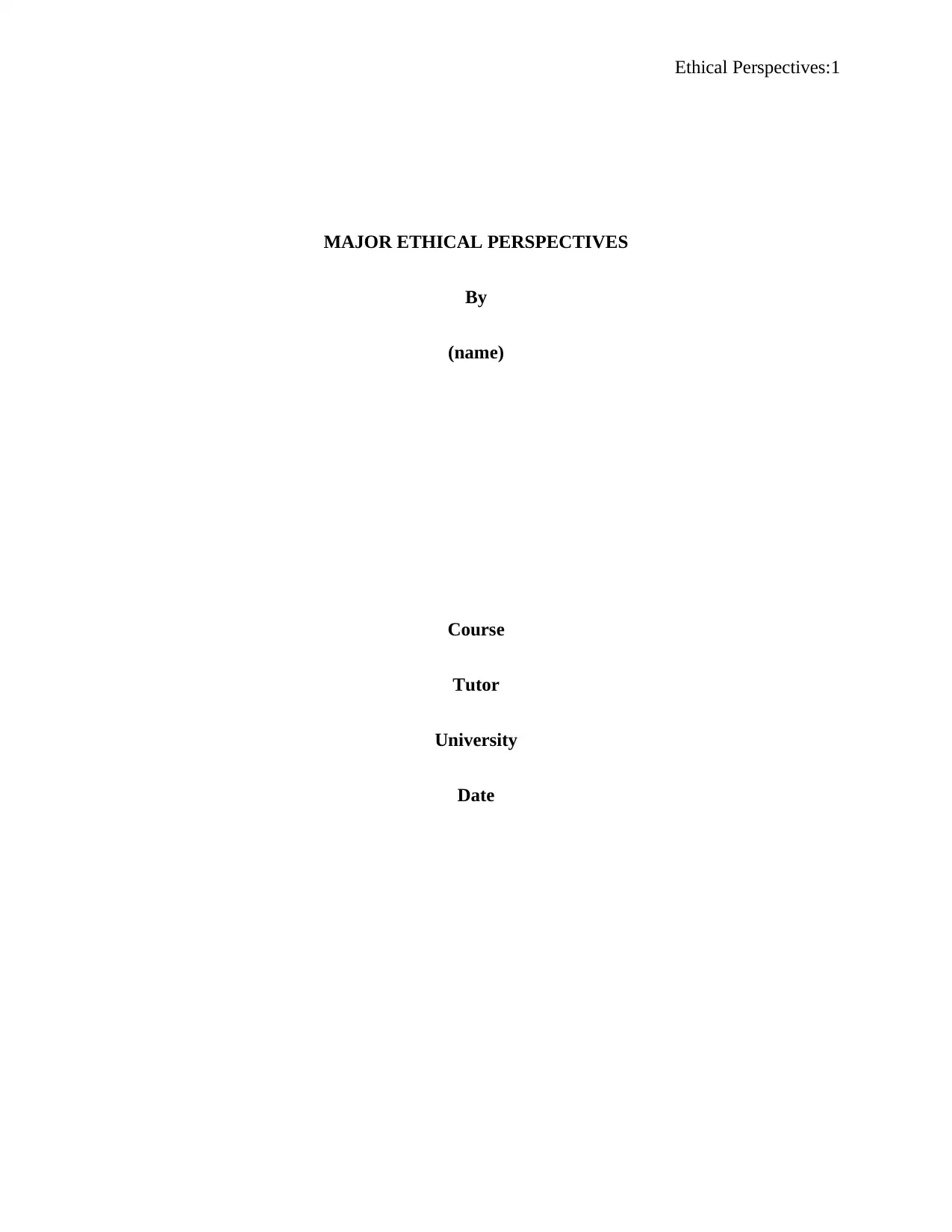
Ethical Perspectives:1
MAJOR ETHICAL PERSPECTIVES
By
(name)
Course
Tutor
University
Date
MAJOR ETHICAL PERSPECTIVES
By
(name)
Course
Tutor
University
Date
Paraphrase This Document
Need a fresh take? Get an instant paraphrase of this document with our AI Paraphraser
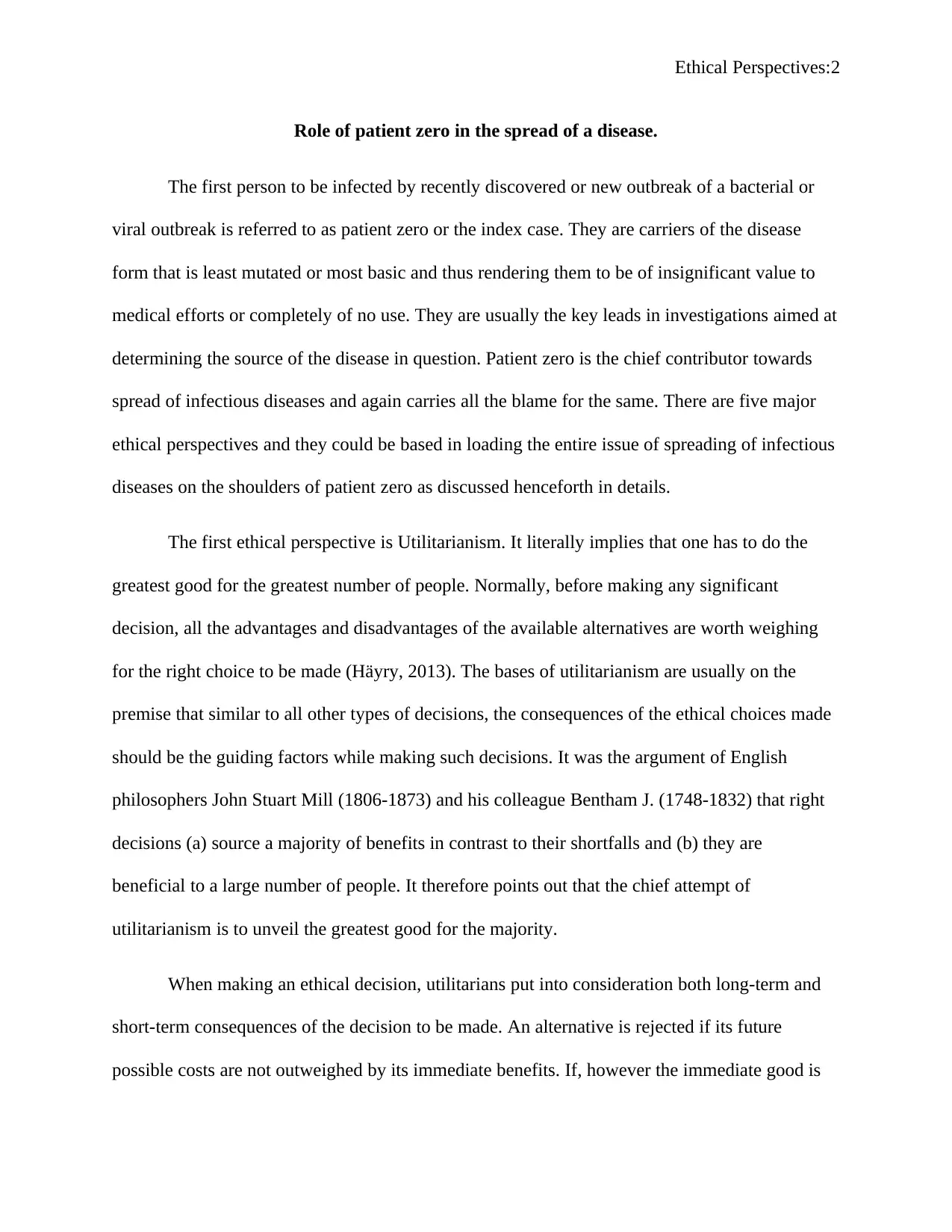
Ethical Perspectives:2
Role of patient zero in the spread of a disease.
The first person to be infected by recently discovered or new outbreak of a bacterial or
viral outbreak is referred to as patient zero or the index case. They are carriers of the disease
form that is least mutated or most basic and thus rendering them to be of insignificant value to
medical efforts or completely of no use. They are usually the key leads in investigations aimed at
determining the source of the disease in question. Patient zero is the chief contributor towards
spread of infectious diseases and again carries all the blame for the same. There are five major
ethical perspectives and they could be based in loading the entire issue of spreading of infectious
diseases on the shoulders of patient zero as discussed henceforth in details.
The first ethical perspective is Utilitarianism. It literally implies that one has to do the
greatest good for the greatest number of people. Normally, before making any significant
decision, all the advantages and disadvantages of the available alternatives are worth weighing
for the right choice to be made (Häyry, 2013). The bases of utilitarianism are usually on the
premise that similar to all other types of decisions, the consequences of the ethical choices made
should be the guiding factors while making such decisions. It was the argument of English
philosophers John Stuart Mill (1806-1873) and his colleague Bentham J. (1748-1832) that right
decisions (a) source a majority of benefits in contrast to their shortfalls and (b) they are
beneficial to a large number of people. It therefore points out that the chief attempt of
utilitarianism is to unveil the greatest good for the majority.
When making an ethical decision, utilitarians put into consideration both long-term and
short-term consequences of the decision to be made. An alternative is rejected if its future
possible costs are not outweighed by its immediate benefits. If, however the immediate good is
Role of patient zero in the spread of a disease.
The first person to be infected by recently discovered or new outbreak of a bacterial or
viral outbreak is referred to as patient zero or the index case. They are carriers of the disease
form that is least mutated or most basic and thus rendering them to be of insignificant value to
medical efforts or completely of no use. They are usually the key leads in investigations aimed at
determining the source of the disease in question. Patient zero is the chief contributor towards
spread of infectious diseases and again carries all the blame for the same. There are five major
ethical perspectives and they could be based in loading the entire issue of spreading of infectious
diseases on the shoulders of patient zero as discussed henceforth in details.
The first ethical perspective is Utilitarianism. It literally implies that one has to do the
greatest good for the greatest number of people. Normally, before making any significant
decision, all the advantages and disadvantages of the available alternatives are worth weighing
for the right choice to be made (Häyry, 2013). The bases of utilitarianism are usually on the
premise that similar to all other types of decisions, the consequences of the ethical choices made
should be the guiding factors while making such decisions. It was the argument of English
philosophers John Stuart Mill (1806-1873) and his colleague Bentham J. (1748-1832) that right
decisions (a) source a majority of benefits in contrast to their shortfalls and (b) they are
beneficial to a large number of people. It therefore points out that the chief attempt of
utilitarianism is to unveil the greatest good for the majority.
When making an ethical decision, utilitarians put into consideration both long-term and
short-term consequences of the decision to be made. An alternative is rejected if its future
possible costs are not outweighed by its immediate benefits. If, however the immediate good is
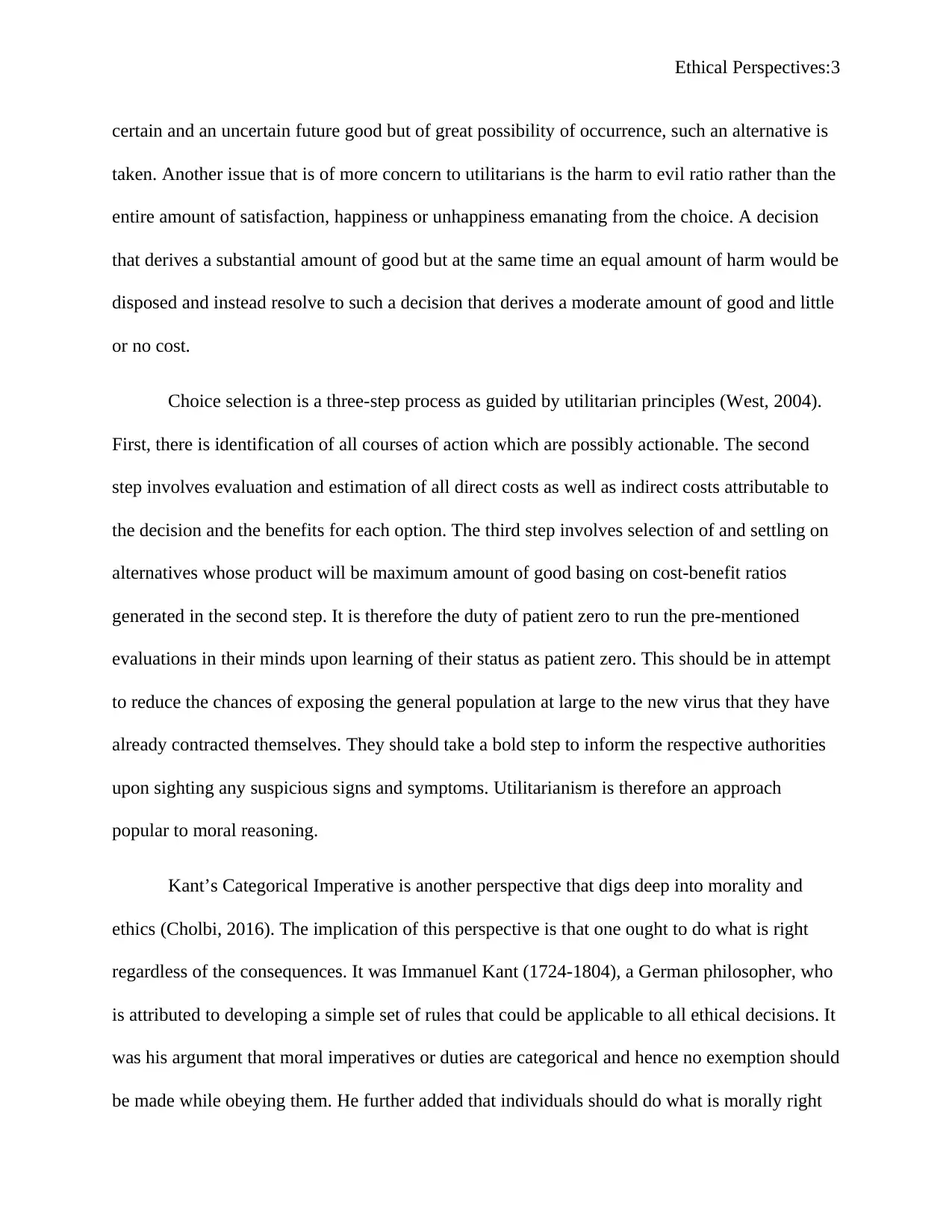
Ethical Perspectives:3
certain and an uncertain future good but of great possibility of occurrence, such an alternative is
taken. Another issue that is of more concern to utilitarians is the harm to evil ratio rather than the
entire amount of satisfaction, happiness or unhappiness emanating from the choice. A decision
that derives a substantial amount of good but at the same time an equal amount of harm would be
disposed and instead resolve to such a decision that derives a moderate amount of good and little
or no cost.
Choice selection is a three-step process as guided by utilitarian principles (West, 2004).
First, there is identification of all courses of action which are possibly actionable. The second
step involves evaluation and estimation of all direct costs as well as indirect costs attributable to
the decision and the benefits for each option. The third step involves selection of and settling on
alternatives whose product will be maximum amount of good basing on cost-benefit ratios
generated in the second step. It is therefore the duty of patient zero to run the pre-mentioned
evaluations in their minds upon learning of their status as patient zero. This should be in attempt
to reduce the chances of exposing the general population at large to the new virus that they have
already contracted themselves. They should take a bold step to inform the respective authorities
upon sighting any suspicious signs and symptoms. Utilitarianism is therefore an approach
popular to moral reasoning.
Kant’s Categorical Imperative is another perspective that digs deep into morality and
ethics (Cholbi, 2016). The implication of this perspective is that one ought to do what is right
regardless of the consequences. It was Immanuel Kant (1724-1804), a German philosopher, who
is attributed to developing a simple set of rules that could be applicable to all ethical decisions. It
was his argument that moral imperatives or duties are categorical and hence no exemption should
be made while obeying them. He further added that individuals should do what is morally right
certain and an uncertain future good but of great possibility of occurrence, such an alternative is
taken. Another issue that is of more concern to utilitarians is the harm to evil ratio rather than the
entire amount of satisfaction, happiness or unhappiness emanating from the choice. A decision
that derives a substantial amount of good but at the same time an equal amount of harm would be
disposed and instead resolve to such a decision that derives a moderate amount of good and little
or no cost.
Choice selection is a three-step process as guided by utilitarian principles (West, 2004).
First, there is identification of all courses of action which are possibly actionable. The second
step involves evaluation and estimation of all direct costs as well as indirect costs attributable to
the decision and the benefits for each option. The third step involves selection of and settling on
alternatives whose product will be maximum amount of good basing on cost-benefit ratios
generated in the second step. It is therefore the duty of patient zero to run the pre-mentioned
evaluations in their minds upon learning of their status as patient zero. This should be in attempt
to reduce the chances of exposing the general population at large to the new virus that they have
already contracted themselves. They should take a bold step to inform the respective authorities
upon sighting any suspicious signs and symptoms. Utilitarianism is therefore an approach
popular to moral reasoning.
Kant’s Categorical Imperative is another perspective that digs deep into morality and
ethics (Cholbi, 2016). The implication of this perspective is that one ought to do what is right
regardless of the consequences. It was Immanuel Kant (1724-1804), a German philosopher, who
is attributed to developing a simple set of rules that could be applicable to all ethical decisions. It
was his argument that moral imperatives or duties are categorical and hence no exemption should
be made while obeying them. He further added that individuals should do what is morally right
⊘ This is a preview!⊘
Do you want full access?
Subscribe today to unlock all pages.

Trusted by 1+ million students worldwide
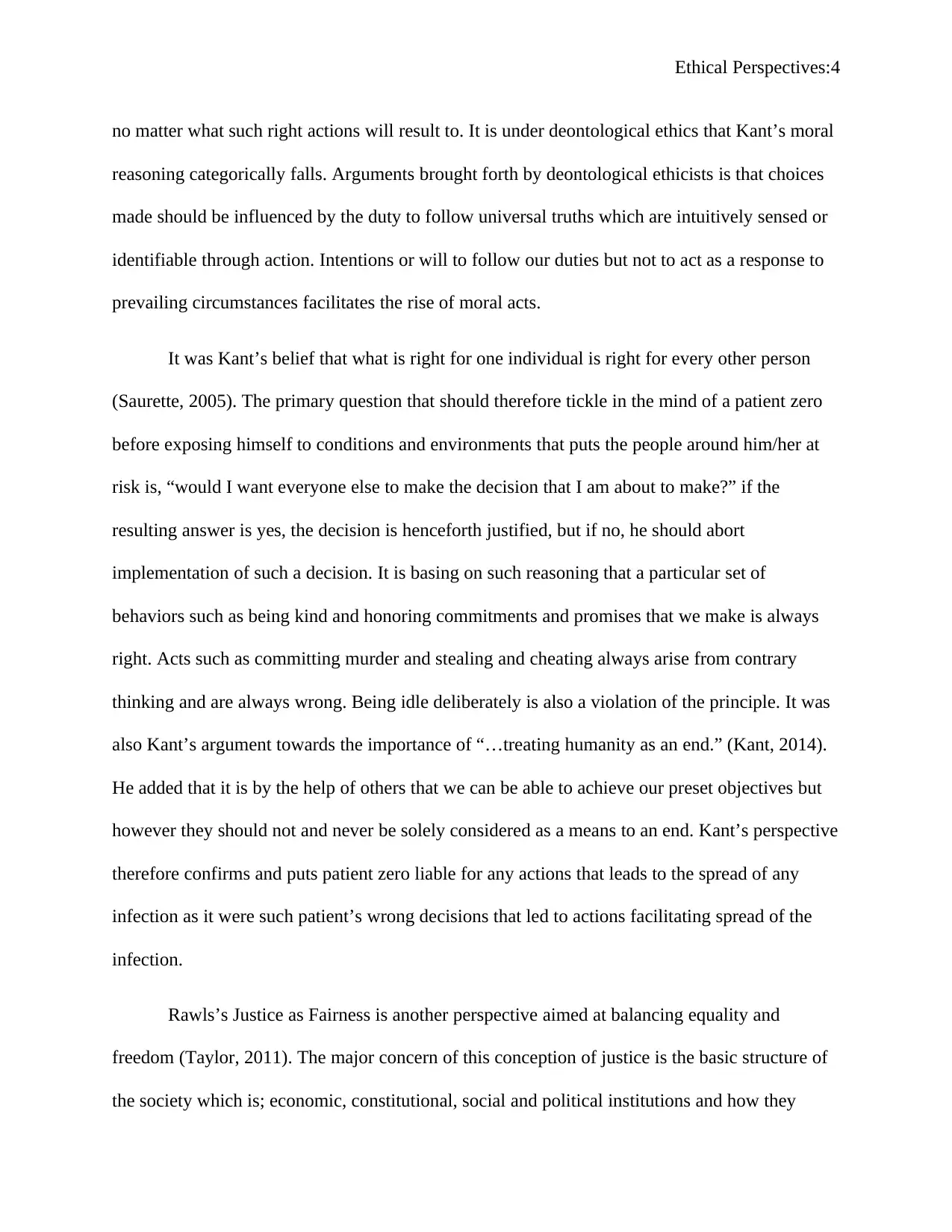
Ethical Perspectives:4
no matter what such right actions will result to. It is under deontological ethics that Kant’s moral
reasoning categorically falls. Arguments brought forth by deontological ethicists is that choices
made should be influenced by the duty to follow universal truths which are intuitively sensed or
identifiable through action. Intentions or will to follow our duties but not to act as a response to
prevailing circumstances facilitates the rise of moral acts.
It was Kant’s belief that what is right for one individual is right for every other person
(Saurette, 2005). The primary question that should therefore tickle in the mind of a patient zero
before exposing himself to conditions and environments that puts the people around him/her at
risk is, “would I want everyone else to make the decision that I am about to make?” if the
resulting answer is yes, the decision is henceforth justified, but if no, he should abort
implementation of such a decision. It is basing on such reasoning that a particular set of
behaviors such as being kind and honoring commitments and promises that we make is always
right. Acts such as committing murder and stealing and cheating always arise from contrary
thinking and are always wrong. Being idle deliberately is also a violation of the principle. It was
also Kant’s argument towards the importance of “…treating humanity as an end.” (Kant, 2014).
He added that it is by the help of others that we can be able to achieve our preset objectives but
however they should not and never be solely considered as a means to an end. Kant’s perspective
therefore confirms and puts patient zero liable for any actions that leads to the spread of any
infection as it were such patient’s wrong decisions that led to actions facilitating spread of the
infection.
Rawls’s Justice as Fairness is another perspective aimed at balancing equality and
freedom (Taylor, 2011). The major concern of this conception of justice is the basic structure of
the society which is; economic, constitutional, social and political institutions and how they
no matter what such right actions will result to. It is under deontological ethics that Kant’s moral
reasoning categorically falls. Arguments brought forth by deontological ethicists is that choices
made should be influenced by the duty to follow universal truths which are intuitively sensed or
identifiable through action. Intentions or will to follow our duties but not to act as a response to
prevailing circumstances facilitates the rise of moral acts.
It was Kant’s belief that what is right for one individual is right for every other person
(Saurette, 2005). The primary question that should therefore tickle in the mind of a patient zero
before exposing himself to conditions and environments that puts the people around him/her at
risk is, “would I want everyone else to make the decision that I am about to make?” if the
resulting answer is yes, the decision is henceforth justified, but if no, he should abort
implementation of such a decision. It is basing on such reasoning that a particular set of
behaviors such as being kind and honoring commitments and promises that we make is always
right. Acts such as committing murder and stealing and cheating always arise from contrary
thinking and are always wrong. Being idle deliberately is also a violation of the principle. It was
also Kant’s argument towards the importance of “…treating humanity as an end.” (Kant, 2014).
He added that it is by the help of others that we can be able to achieve our preset objectives but
however they should not and never be solely considered as a means to an end. Kant’s perspective
therefore confirms and puts patient zero liable for any actions that leads to the spread of any
infection as it were such patient’s wrong decisions that led to actions facilitating spread of the
infection.
Rawls’s Justice as Fairness is another perspective aimed at balancing equality and
freedom (Taylor, 2011). The major concern of this conception of justice is the basic structure of
the society which is; economic, constitutional, social and political institutions and how they
Paraphrase This Document
Need a fresh take? Get an instant paraphrase of this document with our AI Paraphraser
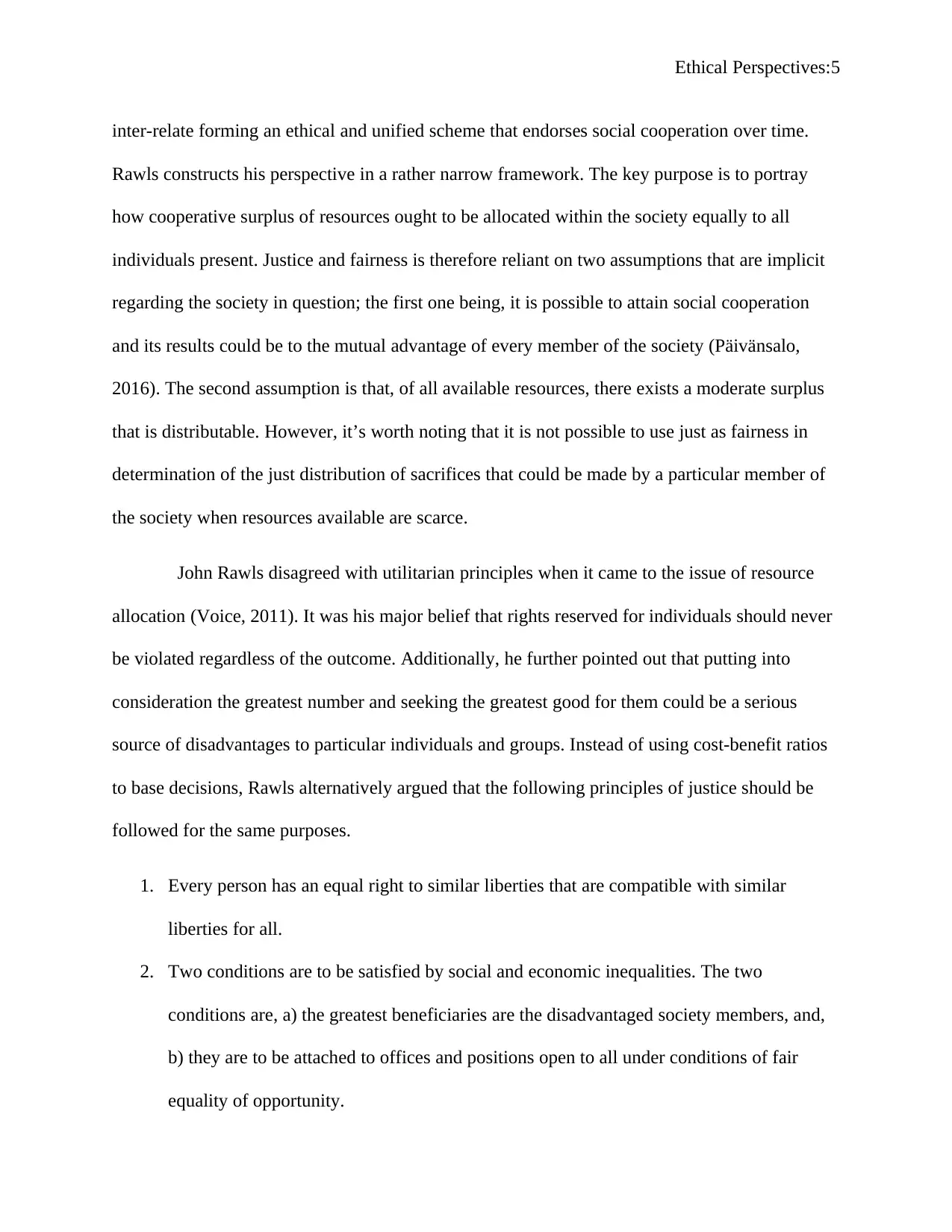
Ethical Perspectives:5
inter-relate forming an ethical and unified scheme that endorses social cooperation over time.
Rawls constructs his perspective in a rather narrow framework. The key purpose is to portray
how cooperative surplus of resources ought to be allocated within the society equally to all
individuals present. Justice and fairness is therefore reliant on two assumptions that are implicit
regarding the society in question; the first one being, it is possible to attain social cooperation
and its results could be to the mutual advantage of every member of the society (Päivänsalo,
2016). The second assumption is that, of all available resources, there exists a moderate surplus
that is distributable. However, it’s worth noting that it is not possible to use just as fairness in
determination of the just distribution of sacrifices that could be made by a particular member of
the society when resources available are scarce.
John Rawls disagreed with utilitarian principles when it came to the issue of resource
allocation (Voice, 2011). It was his major belief that rights reserved for individuals should never
be violated regardless of the outcome. Additionally, he further pointed out that putting into
consideration the greatest number and seeking the greatest good for them could be a serious
source of disadvantages to particular individuals and groups. Instead of using cost-benefit ratios
to base decisions, Rawls alternatively argued that the following principles of justice should be
followed for the same purposes.
1. Every person has an equal right to similar liberties that are compatible with similar
liberties for all.
2. Two conditions are to be satisfied by social and economic inequalities. The two
conditions are, a) the greatest beneficiaries are the disadvantaged society members, and,
b) they are to be attached to offices and positions open to all under conditions of fair
equality of opportunity.
inter-relate forming an ethical and unified scheme that endorses social cooperation over time.
Rawls constructs his perspective in a rather narrow framework. The key purpose is to portray
how cooperative surplus of resources ought to be allocated within the society equally to all
individuals present. Justice and fairness is therefore reliant on two assumptions that are implicit
regarding the society in question; the first one being, it is possible to attain social cooperation
and its results could be to the mutual advantage of every member of the society (Päivänsalo,
2016). The second assumption is that, of all available resources, there exists a moderate surplus
that is distributable. However, it’s worth noting that it is not possible to use just as fairness in
determination of the just distribution of sacrifices that could be made by a particular member of
the society when resources available are scarce.
John Rawls disagreed with utilitarian principles when it came to the issue of resource
allocation (Voice, 2011). It was his major belief that rights reserved for individuals should never
be violated regardless of the outcome. Additionally, he further pointed out that putting into
consideration the greatest number and seeking the greatest good for them could be a serious
source of disadvantages to particular individuals and groups. Instead of using cost-benefit ratios
to base decisions, Rawls alternatively argued that the following principles of justice should be
followed for the same purposes.
1. Every person has an equal right to similar liberties that are compatible with similar
liberties for all.
2. Two conditions are to be satisfied by social and economic inequalities. The two
conditions are, a) the greatest beneficiaries are the disadvantaged society members, and,
b) they are to be attached to offices and positions open to all under conditions of fair
equality of opportunity.
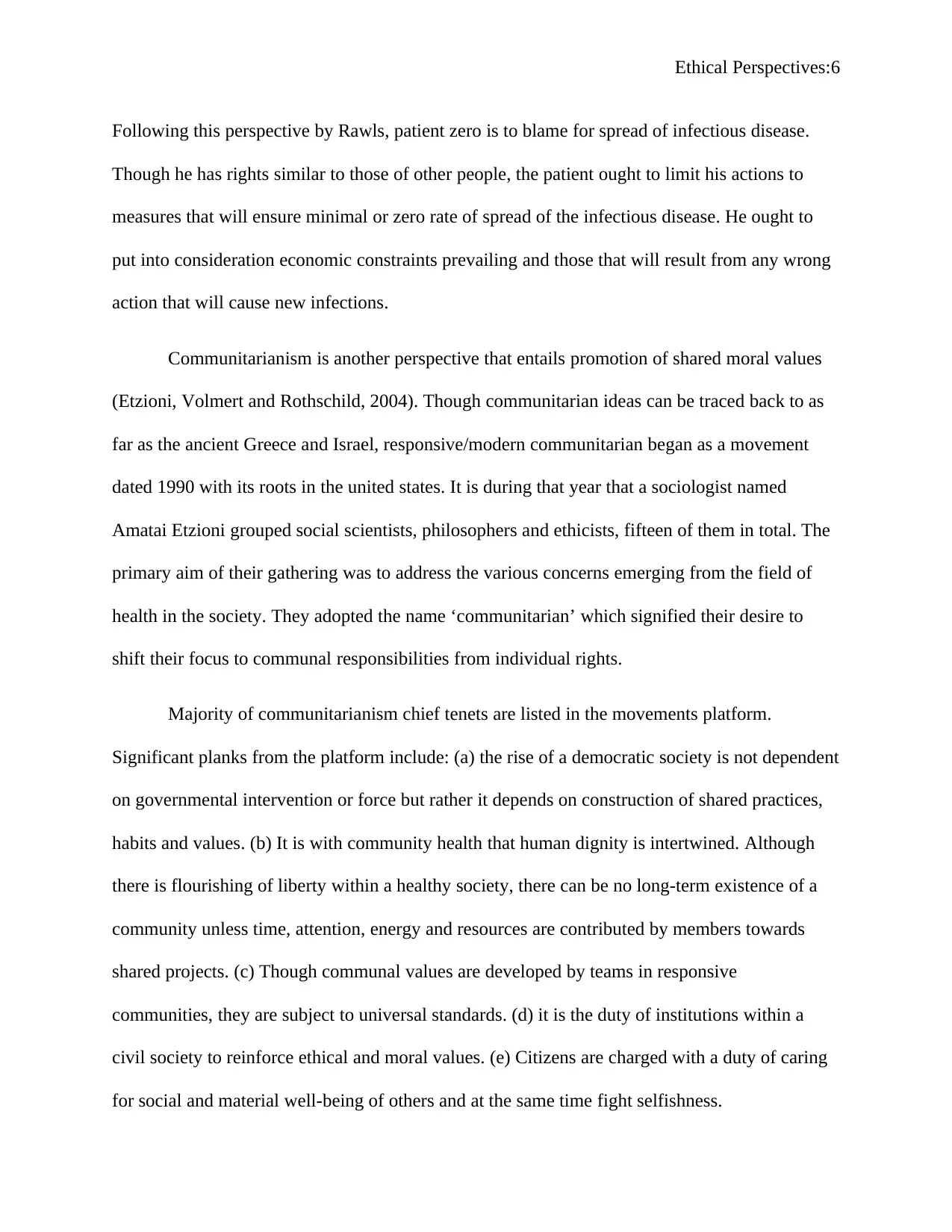
Ethical Perspectives:6
Following this perspective by Rawls, patient zero is to blame for spread of infectious disease.
Though he has rights similar to those of other people, the patient ought to limit his actions to
measures that will ensure minimal or zero rate of spread of the infectious disease. He ought to
put into consideration economic constraints prevailing and those that will result from any wrong
action that will cause new infections.
Communitarianism is another perspective that entails promotion of shared moral values
(Etzioni, Volmert and Rothschild, 2004). Though communitarian ideas can be traced back to as
far as the ancient Greece and Israel, responsive/modern communitarian began as a movement
dated 1990 with its roots in the united states. It is during that year that a sociologist named
Amatai Etzioni grouped social scientists, philosophers and ethicists, fifteen of them in total. The
primary aim of their gathering was to address the various concerns emerging from the field of
health in the society. They adopted the name ‘communitarian’ which signified their desire to
shift their focus to communal responsibilities from individual rights.
Majority of communitarianism chief tenets are listed in the movements platform.
Significant planks from the platform include: (a) the rise of a democratic society is not dependent
on governmental intervention or force but rather it depends on construction of shared practices,
habits and values. (b) It is with community health that human dignity is intertwined. Although
there is flourishing of liberty within a healthy society, there can be no long-term existence of a
community unless time, attention, energy and resources are contributed by members towards
shared projects. (c) Though communal values are developed by teams in responsive
communities, they are subject to universal standards. (d) it is the duty of institutions within a
civil society to reinforce ethical and moral values. (e) Citizens are charged with a duty of caring
for social and material well-being of others and at the same time fight selfishness.
Following this perspective by Rawls, patient zero is to blame for spread of infectious disease.
Though he has rights similar to those of other people, the patient ought to limit his actions to
measures that will ensure minimal or zero rate of spread of the infectious disease. He ought to
put into consideration economic constraints prevailing and those that will result from any wrong
action that will cause new infections.
Communitarianism is another perspective that entails promotion of shared moral values
(Etzioni, Volmert and Rothschild, 2004). Though communitarian ideas can be traced back to as
far as the ancient Greece and Israel, responsive/modern communitarian began as a movement
dated 1990 with its roots in the united states. It is during that year that a sociologist named
Amatai Etzioni grouped social scientists, philosophers and ethicists, fifteen of them in total. The
primary aim of their gathering was to address the various concerns emerging from the field of
health in the society. They adopted the name ‘communitarian’ which signified their desire to
shift their focus to communal responsibilities from individual rights.
Majority of communitarianism chief tenets are listed in the movements platform.
Significant planks from the platform include: (a) the rise of a democratic society is not dependent
on governmental intervention or force but rather it depends on construction of shared practices,
habits and values. (b) It is with community health that human dignity is intertwined. Although
there is flourishing of liberty within a healthy society, there can be no long-term existence of a
community unless time, attention, energy and resources are contributed by members towards
shared projects. (c) Though communal values are developed by teams in responsive
communities, they are subject to universal standards. (d) it is the duty of institutions within a
civil society to reinforce ethical and moral values. (e) Citizens are charged with a duty of caring
for social and material well-being of others and at the same time fight selfishness.
⊘ This is a preview!⊘
Do you want full access?
Subscribe today to unlock all pages.

Trusted by 1+ million students worldwide
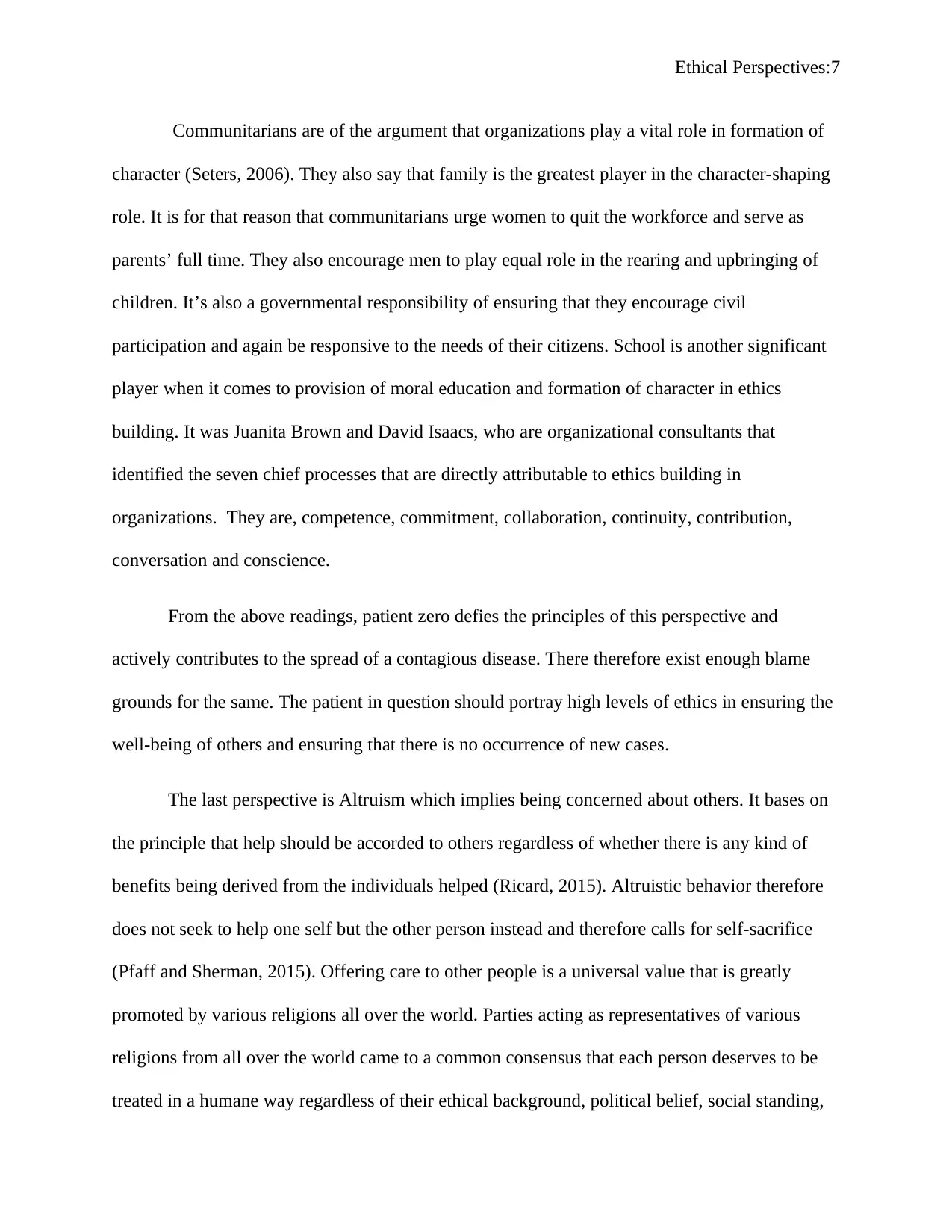
Ethical Perspectives:7
Communitarians are of the argument that organizations play a vital role in formation of
character (Seters, 2006). They also say that family is the greatest player in the character-shaping
role. It is for that reason that communitarians urge women to quit the workforce and serve as
parents’ full time. They also encourage men to play equal role in the rearing and upbringing of
children. It’s also a governmental responsibility of ensuring that they encourage civil
participation and again be responsive to the needs of their citizens. School is another significant
player when it comes to provision of moral education and formation of character in ethics
building. It was Juanita Brown and David Isaacs, who are organizational consultants that
identified the seven chief processes that are directly attributable to ethics building in
organizations. They are, competence, commitment, collaboration, continuity, contribution,
conversation and conscience.
From the above readings, patient zero defies the principles of this perspective and
actively contributes to the spread of a contagious disease. There therefore exist enough blame
grounds for the same. The patient in question should portray high levels of ethics in ensuring the
well-being of others and ensuring that there is no occurrence of new cases.
The last perspective is Altruism which implies being concerned about others. It bases on
the principle that help should be accorded to others regardless of whether there is any kind of
benefits being derived from the individuals helped (Ricard, 2015). Altruistic behavior therefore
does not seek to help one self but the other person instead and therefore calls for self-sacrifice
(Pfaff and Sherman, 2015). Offering care to other people is a universal value that is greatly
promoted by various religions all over the world. Parties acting as representatives of various
religions from all over the world came to a common consensus that each person deserves to be
treated in a humane way regardless of their ethical background, political belief, social standing,
Communitarians are of the argument that organizations play a vital role in formation of
character (Seters, 2006). They also say that family is the greatest player in the character-shaping
role. It is for that reason that communitarians urge women to quit the workforce and serve as
parents’ full time. They also encourage men to play equal role in the rearing and upbringing of
children. It’s also a governmental responsibility of ensuring that they encourage civil
participation and again be responsive to the needs of their citizens. School is another significant
player when it comes to provision of moral education and formation of character in ethics
building. It was Juanita Brown and David Isaacs, who are organizational consultants that
identified the seven chief processes that are directly attributable to ethics building in
organizations. They are, competence, commitment, collaboration, continuity, contribution,
conversation and conscience.
From the above readings, patient zero defies the principles of this perspective and
actively contributes to the spread of a contagious disease. There therefore exist enough blame
grounds for the same. The patient in question should portray high levels of ethics in ensuring the
well-being of others and ensuring that there is no occurrence of new cases.
The last perspective is Altruism which implies being concerned about others. It bases on
the principle that help should be accorded to others regardless of whether there is any kind of
benefits being derived from the individuals helped (Ricard, 2015). Altruistic behavior therefore
does not seek to help one self but the other person instead and therefore calls for self-sacrifice
(Pfaff and Sherman, 2015). Offering care to other people is a universal value that is greatly
promoted by various religions all over the world. Parties acting as representatives of various
religions from all over the world came to a common consensus that each person deserves to be
treated in a humane way regardless of their ethical background, political belief, social standing,
Paraphrase This Document
Need a fresh take? Get an instant paraphrase of this document with our AI Paraphraser
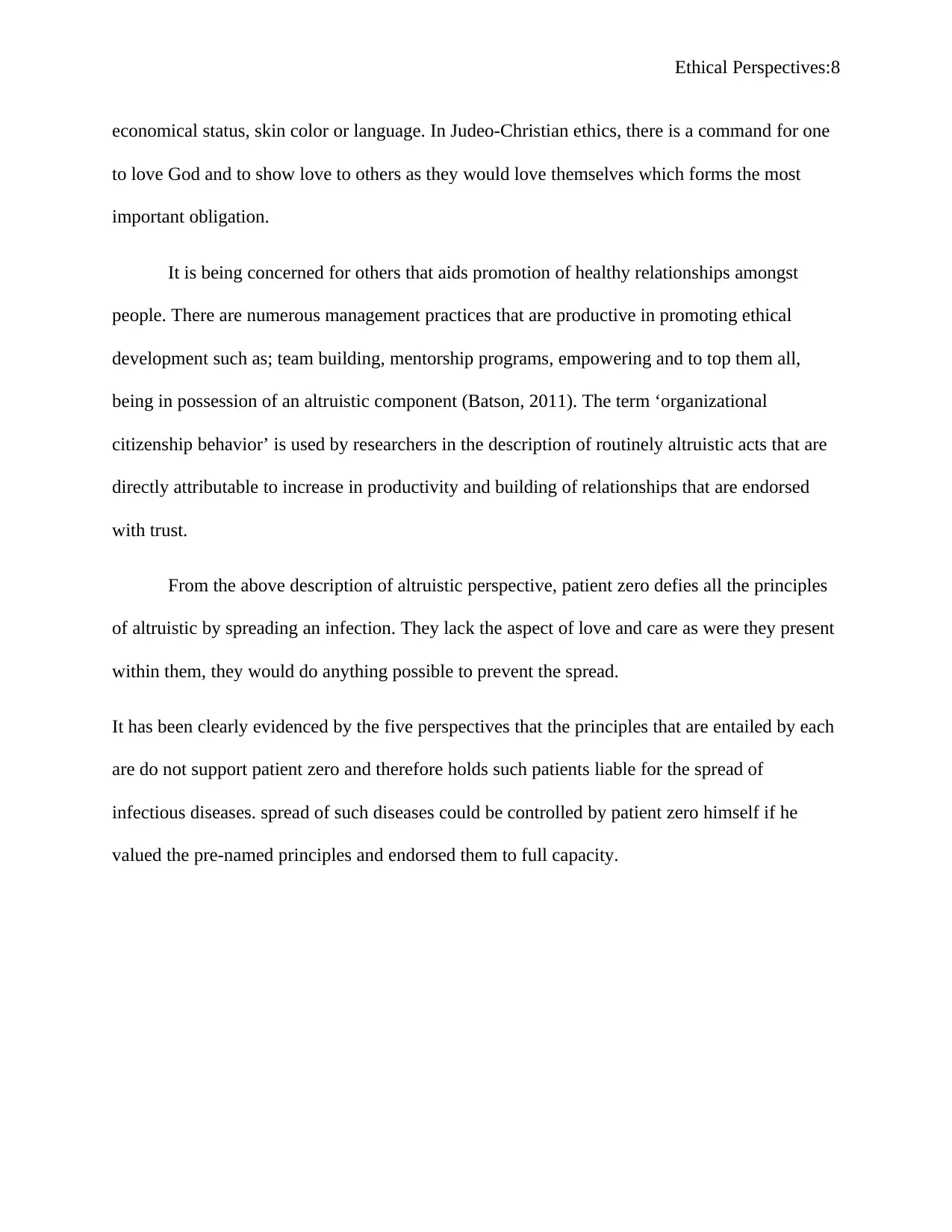
Ethical Perspectives:8
economical status, skin color or language. In Judeo-Christian ethics, there is a command for one
to love God and to show love to others as they would love themselves which forms the most
important obligation.
It is being concerned for others that aids promotion of healthy relationships amongst
people. There are numerous management practices that are productive in promoting ethical
development such as; team building, mentorship programs, empowering and to top them all,
being in possession of an altruistic component (Batson, 2011). The term ‘organizational
citizenship behavior’ is used by researchers in the description of routinely altruistic acts that are
directly attributable to increase in productivity and building of relationships that are endorsed
with trust.
From the above description of altruistic perspective, patient zero defies all the principles
of altruistic by spreading an infection. They lack the aspect of love and care as were they present
within them, they would do anything possible to prevent the spread.
It has been clearly evidenced by the five perspectives that the principles that are entailed by each
are do not support patient zero and therefore holds such patients liable for the spread of
infectious diseases. spread of such diseases could be controlled by patient zero himself if he
valued the pre-named principles and endorsed them to full capacity.
economical status, skin color or language. In Judeo-Christian ethics, there is a command for one
to love God and to show love to others as they would love themselves which forms the most
important obligation.
It is being concerned for others that aids promotion of healthy relationships amongst
people. There are numerous management practices that are productive in promoting ethical
development such as; team building, mentorship programs, empowering and to top them all,
being in possession of an altruistic component (Batson, 2011). The term ‘organizational
citizenship behavior’ is used by researchers in the description of routinely altruistic acts that are
directly attributable to increase in productivity and building of relationships that are endorsed
with trust.
From the above description of altruistic perspective, patient zero defies all the principles
of altruistic by spreading an infection. They lack the aspect of love and care as were they present
within them, they would do anything possible to prevent the spread.
It has been clearly evidenced by the five perspectives that the principles that are entailed by each
are do not support patient zero and therefore holds such patients liable for the spread of
infectious diseases. spread of such diseases could be controlled by patient zero himself if he
valued the pre-named principles and endorsed them to full capacity.
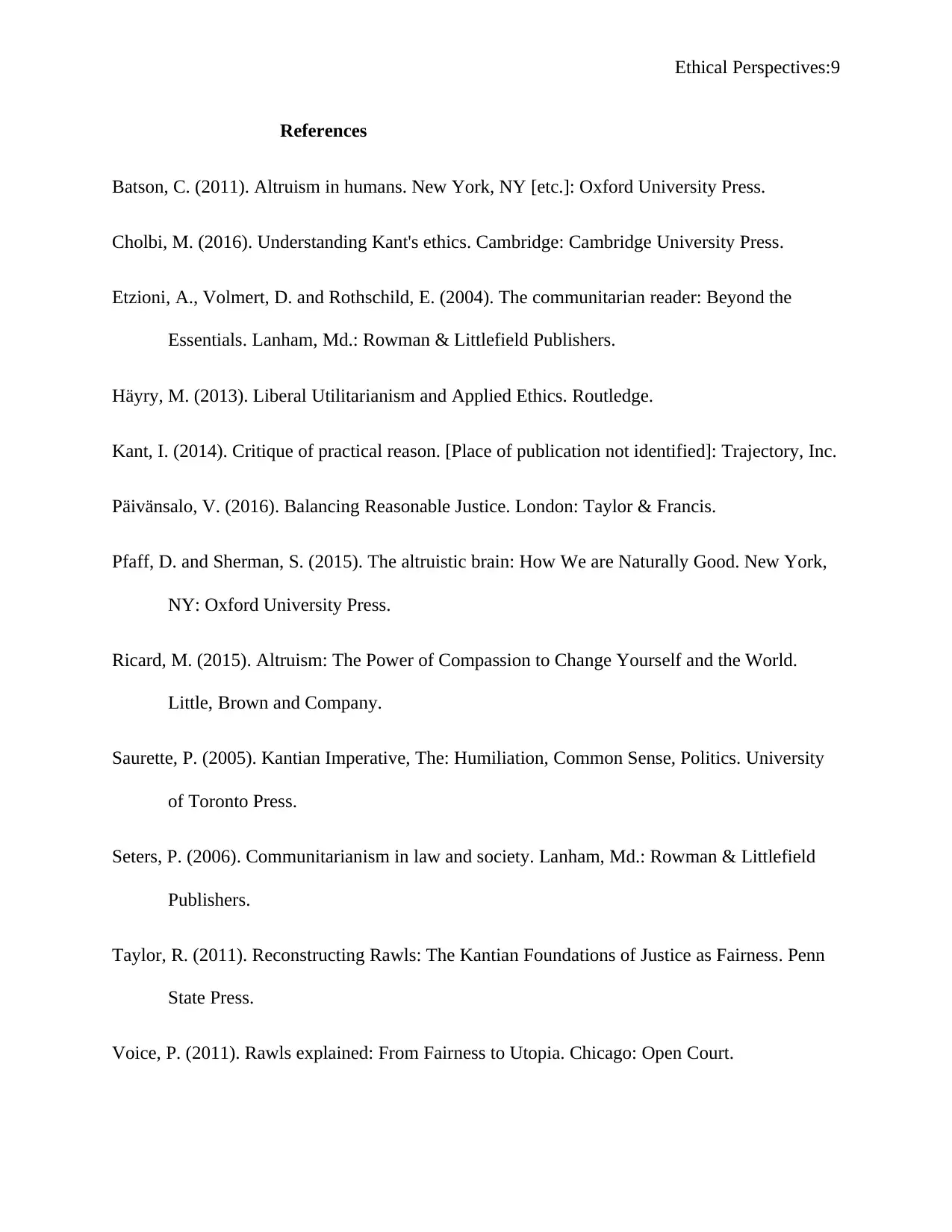
Ethical Perspectives:9
References
Batson, C. (2011). Altruism in humans. New York, NY [etc.]: Oxford University Press.
Cholbi, M. (2016). Understanding Kant's ethics. Cambridge: Cambridge University Press.
Etzioni, A., Volmert, D. and Rothschild, E. (2004). The communitarian reader: Beyond the
Essentials. Lanham, Md.: Rowman & Littlefield Publishers.
Häyry, M. (2013). Liberal Utilitarianism and Applied Ethics. Routledge.
Kant, I. (2014). Critique of practical reason. [Place of publication not identified]: Trajectory, Inc.
Päivänsalo, V. (2016). Balancing Reasonable Justice. London: Taylor & Francis.
Pfaff, D. and Sherman, S. (2015). The altruistic brain: How We are Naturally Good. New York,
NY: Oxford University Press.
Ricard, M. (2015). Altruism: The Power of Compassion to Change Yourself and the World.
Little, Brown and Company.
Saurette, P. (2005). Kantian Imperative, The: Humiliation, Common Sense, Politics. University
of Toronto Press.
Seters, P. (2006). Communitarianism in law and society. Lanham, Md.: Rowman & Littlefield
Publishers.
Taylor, R. (2011). Reconstructing Rawls: The Kantian Foundations of Justice as Fairness. Penn
State Press.
Voice, P. (2011). Rawls explained: From Fairness to Utopia. Chicago: Open Court.
References
Batson, C. (2011). Altruism in humans. New York, NY [etc.]: Oxford University Press.
Cholbi, M. (2016). Understanding Kant's ethics. Cambridge: Cambridge University Press.
Etzioni, A., Volmert, D. and Rothschild, E. (2004). The communitarian reader: Beyond the
Essentials. Lanham, Md.: Rowman & Littlefield Publishers.
Häyry, M. (2013). Liberal Utilitarianism and Applied Ethics. Routledge.
Kant, I. (2014). Critique of practical reason. [Place of publication not identified]: Trajectory, Inc.
Päivänsalo, V. (2016). Balancing Reasonable Justice. London: Taylor & Francis.
Pfaff, D. and Sherman, S. (2015). The altruistic brain: How We are Naturally Good. New York,
NY: Oxford University Press.
Ricard, M. (2015). Altruism: The Power of Compassion to Change Yourself and the World.
Little, Brown and Company.
Saurette, P. (2005). Kantian Imperative, The: Humiliation, Common Sense, Politics. University
of Toronto Press.
Seters, P. (2006). Communitarianism in law and society. Lanham, Md.: Rowman & Littlefield
Publishers.
Taylor, R. (2011). Reconstructing Rawls: The Kantian Foundations of Justice as Fairness. Penn
State Press.
Voice, P. (2011). Rawls explained: From Fairness to Utopia. Chicago: Open Court.
⊘ This is a preview!⊘
Do you want full access?
Subscribe today to unlock all pages.

Trusted by 1+ million students worldwide

Ethical Perspectives:10
West, H. (2004). An introduction to Mill's utilitarian ethics. Cambridge [u.a.]: Cambridge Univ.
Press.
West, H. (2004). An introduction to Mill's utilitarian ethics. Cambridge [u.a.]: Cambridge Univ.
Press.
1 out of 10
Your All-in-One AI-Powered Toolkit for Academic Success.
+13062052269
info@desklib.com
Available 24*7 on WhatsApp / Email
![[object Object]](/_next/static/media/star-bottom.7253800d.svg)
Unlock your academic potential
Copyright © 2020–2025 A2Z Services. All Rights Reserved. Developed and managed by ZUCOL.


